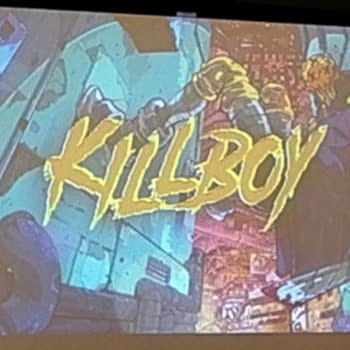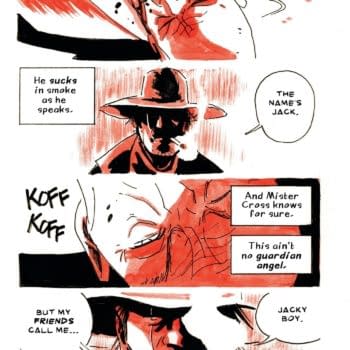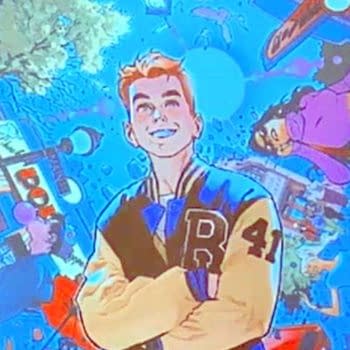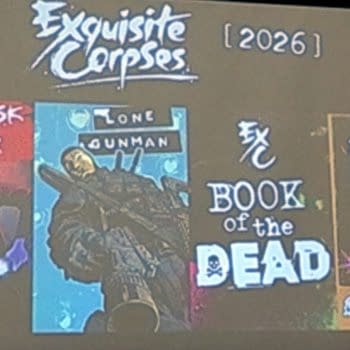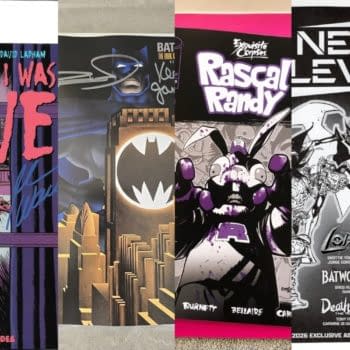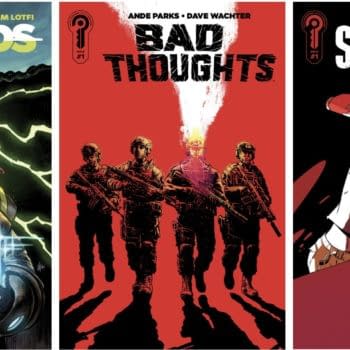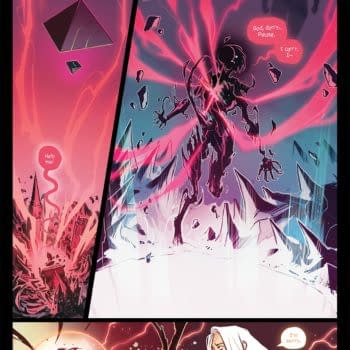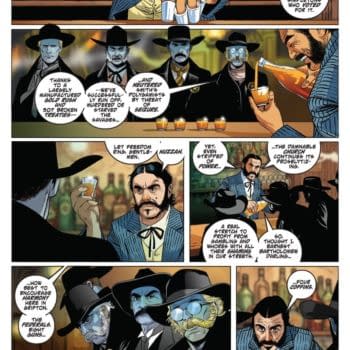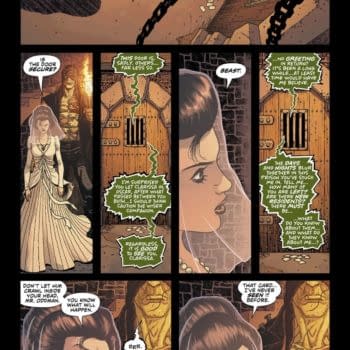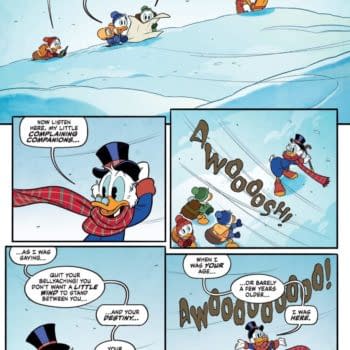Posted in: Comics, Conventions, Phoenix Comicon | Tagged: Comics, entertainment, phoenix comicon
Life After Star Wars: The Fillbach Brothers Talk About Their Own Graphic Novels
From Neil Greenaway (of Nerd Team 30):
I had first heard about the Fillbach Brothers through their collaborations with Joseph Michael Linsner on some of his Dawn comics in the '90s. They followed that up with comics of their own from Sirius and then Dark Horse. They spent almost a decade working on the Star Wars: Clone Wars Adventures series. They now have an exclusive contract with 1First Comics, and they are busy pumping out a whole line of new graphic novels and follow-ups to stories that were never finished.
When I found out that Matthew and Shawn would both be at Phoenix Comicon 2017, I knew that I had to take the opportunity to meet them. My reward was a conversation with two of the most genuine and warm individuals you could hope for.
Bleeding Cool: You guys have several new books on your table right now and I thought maybe we could talk about that for a bit.
Matthew Fillbach: We have a plethora. Though we are known for doing Star Wars: Clone Wars Adventures for LucasFilm, and we have none of that.
Shawn Fillbach: Clone Wars Adventures was our big thing, our big seller.
BC: You guys actually did that for several years, right?
SF: Yeah, we did.
MF: About eight years.
SF: We did 15 volumes. And basically we thought, why are we giving all the money to George Lucas? We got to make some of that scratch.
MF: So that is why we did a digest book called Tales of the S.S. Junky Star Vol. 1 with 1First Comics, and Vol. 2 is coming out next month.
BC: Why don't you tell us about the story on that one?
MF: It is essentially a story like Guardians of the Galaxy.
SF: Guardians of the Galaxy ripped us off big-time [laughs]. We even have a plant character called Cricket that is going to grow as the series progresses. It is across six volumes. We have it all mapped out.
MF: We have a color edition coming out next month and Vol. 2 is coming out next month. They are going to be in hardback for the libraries. We go to the ALA, the America Library Association, next month. We got involved thanks to our mother.
SF: And for libraries, hands down, their biggest market is graphic novels. It has been growing exponentially. Anyway, we have got the volumes of Junky Star coming out.
The next book we could talk about would be Captain Freebird. He is our outlaw superhero.
MF: He is insane. We realized that basically all superheroes are insane.
SF: You have to be insane to be a superhero.
BC: To jump in front of a bullet, you have to have a screw loose.
SF: That's it exactly. Well our guy has the soul of a shaman living in his heart. A Native American shaman who gives him crap all the time. He's mojo rising. He's a buffalo half the time, but then sometimes he will be his full shaman self.
MF: Then it's like everyone has a spirit animal, right? Well, his is a frog. So it's Freebird Frog. We originally did this series in 1997/98. But it has a trade now.
SF: So we're getting old.
BC: Now would that come out as a trade paperback or single issues first?
SF: Nope, we don't do floppies anymore. We did that for so many years; now we just want to tell a single story.
MF: The direction of the industry is moving towards doing graphic novels.
SF: And it's so much easier for us to do it that way. We see things as a movie.
MF: Long-form — for us — is where we wanted to go. I see everything at once.
SF: So basically we want to put it down on the page.
MF: It's a film on the page.
SF: We couldn't afford to go to film school because we were poor and–
MF: A little short of supplies, and our "edumacation" was not that good [both laugh]. We achieved in shop class and gym. We got A++++.
SF: So we thought we could draw a little bit and we would tell our movies on the page. Oftentimes we'll do like 50 or 60 pages of just visual storytelling. We find that, for us, it just works out perfectly, and we like watching people's reaction when they are reading.
MF: Years ago we just looked at each other over a cup of coffee in the morning and went, "From now on it's just visuals and dialogue. No narrative, no 'it was a dark and stormy night' or 'meanwhile, back at the ranch'."
SF: Elmore Leonard said it perfectly. He said "Cut out all the stuff that people don't want to read."
MF: He also said "If it sounds like it was written, re-write it." Because we catch ourselves once in a while going like "OK, that's crap." Then we have a punch-out and it's like, "You're right, that was crap. OK, we're moving on."
SF: For Captain Freebird, we are planning two more volumes.
BC: Is that also completely planned out?
Both: Yes.
MF: The first volume is American Prayer. The second volume is called Outlaw Invincible. The third volume is post-apocalyptic.
SF: The Apocalyptic Opera, which we wrote. Something like Logan.
MF: But ours is going to be better. Ours is always better.
SF: Of course.
MF: And then we have Cadaver Dogs of Winter, which is a vengeance tale.
SF: It's a cowboy story.
MF: A small-town Montana doctor's daughter is found dead. And then it gets into bikers. The story involves meth and everything that goes with that. Then it gets into his vengeance trail. So he becomes a wraith of vengeance going after the people at the top. The ending is like pretty amazing and we were going to leave it there. Then one morning (over coffee again), "Holy crap, we have Cadaver Dogs of Summer."
SF: Yeah, Cadaver Dogs of Winter and Cadaver Dogs of Summer.
MF: We can't say much about the story.
SF: But we can say Doc Cooper comes back, and he has gone straight crazy.
MF: He's still on his vengeance trail. I don't want to give anything away.
SF: OK, I'm following your lead here. So we've got that, and then we've got the Dog Soldiers coming out as well.
MF: Dog Soldiers is coming out in the next couple months. It deals with PTSD and service dogs and how service dogs help military vets.
BC: I don't know that I have ever seen that tackled in a comic or graphic novel before.
MF: There was one day — it was Memorial Day or maybe Veterans Day — but we were out barbecuing.
SF: And Matthew saw this show about these veterans coming on with their service dogs.
MF: They were talking about how these dogs saved them from suicide. Our book deals heavily with veteran suicide, as well. And it's like our only book that doesn't have someone die a violent horrible death. It's a love story, too.
SF: There's absolutely no violence in it. We've gotten to know so many veterans through the years at all of the shows, and we tapped them for this.
MF: For questions, because we didn't want to do some crap that was all Hallmark channel and weepy. One of our best friends is Scott "Big Sarge" Garrett; he's the one we first sent it to. He's the one we would talk to a lot when we were doing our research. We had an ulterior motive when we sent it to him. Before we told him our motive, we just wanted to see, "What do you think? Did we get it right?"
SF: And he said, "I don't know how you did your research, but you got it spot on."
MF: Our ulterior motive was for him to do the introduction because he is in the Austin Texas 1919 chapter of the Military Purple Hearts. He is their president. He has become a really good friend and it would be an honor to have him write our introduction.
BC: Wow. That sounds like a book that could have a lasting impact for a lot of people. moving on to something a bit more light hearted, can we talk a little bit about Illuminati Transport?
SF: Oh yes, that is the newest book that just came out.
MF: There is a first volume to this story. The first book was called Roadkill, done in about 2008 by Dark Horse Comics. It was a graphic novel. So we've wanted to do the continuation for years, but we ended up doing like 5000 pages of other books first [laughs]. Then we ended up at 1First Comics with Ken Levine. When we met him, it was just one of those moments where everything just came together perfectly. And we were drawing a bunch of different stuff for him; in fact, we were drawing The Badger for Mike Baron. Then we just decided to take a couple of months and just started doing our own thing.
SF: Kowalski [character in Illuminati Transport] was also in Roadkill with Dark Horse earlier and we just came up with this weird story to follow up on that.
MF: Basically, it's like when you have a team like Hellboy and the BPRD — what happens after the chaos? Who cleans up after that? People have to sift through stuff and take stuff. So he's a trucker, he transports. Hence, Illuminati Transport.
SF: So Kowalski, he's the pickup, trucker guy. So imagine like Jack Burton as the hero, but he's not a hero. He's just kind of like meh. Mike Mignola is so awesome, and we loved the Hellboy movies. So we created this character that we thought Ron Perlman could play. So we basically drew Ron Perlman–
MF: As a giant douchebag. And his name is Branson Missouri.
SF: And Kowalski says things like, "We've worked together for 25 years and he doesn't even know my name." He goes over to get forms signed and Branson says, "Oh no, we don't do autographs here. Oh, you're the trucker guy. You must be new I haven't met you before." And Kowalski's like, "We've been working for 25 years..TOGETHER!" So it's fun like that.
MF: And he has a talking dog named Geech and a Crystal Skull of Doom, which is their GPS. In this story he gets bro–
SF: No, you've got to read the story.
BC: OK then, no spoilers. I think Lives is the only book we haven't discussed. I know that it takes place in New York on 9/11, and deals with five people's lives and how they intersect on that day. What else can you tell me about that one?
MF: Glenn Farrington (the author) is an ex-cop from New York City. He is also a writer, and he works for Disney. He talked to us about this story and we said OK, let's do this.
SF: It's very visual. (There are only four pages with text in the whole book)
MF: So Glenn asked us what we thought. And we were like, "We know how to do this because it is about the minutia of life, the little things that you never think about that happen every day. And then the culmination of five people's lives. Some days matter more than others.
Then we also have Shotgun to Sugarland, which is coming soon. It is 300 pages.
BC: Is that all one volume?
SF: Yes, we only do long-form.
MF: We did Maxwell Strangewell and that was 400 pages from Dark Horse, out of print. If you find it, you should pick it up and bring it over and we'll sign it (both laugh).
But Shotgun to Sugarland — it's another kind of epic story. It's about the importance of women in the world. It's about two women. One is just known as "The Girl", and she's a serial killer. And one is a detective–
SF: Hunting her down and figuring out the pieces. We were actually inspired by our good friends the Soska sisters, whose first film was Dead Hooker in a Trunk. They did the amazing American Mary. We met them and were like, "We're going to draw this for you."
MF: So we actually dedicated the book to them, too. They are our best friends.
SF: They're our girls. That's what we say.
MF: Hallelujah is another book we're working on right now. So we're like, 150 pages in, I think it will be about 300 pages.
SF: We're about halfway done with that one. Hallelujah is just — again, our hero is female — you know the old True Grit? She's like the female Rooster Cogburn.
MF: She's got an eyepatch on the opposite side that he did.
SF: She ends up in this purgatory land and it's a lot of– It's very cowboy.
MF: Very cowboy?
SF: Very cowboy.
MF: Thank God. (laughs) Everything we do is so cowboy.
BC: And that will be coming out from 1First, as well?
MF: Yeah, we are exclusive with 1First Comics. All of the books we have talked about can be had from them.
BC: That's awesome. Having an exclusive contract is very cool. Looking through these books has got me wondering something. When you sit down to do a book together, what is the division of art and writing? Do you both do both? Does one of you sit down and rough out a story while the other works on some art? What is the collaborative process there?
MF: Well, we share a brain. So if we get more than a quarter mile from the other we just fall down and then have to tell people to bring us together. It's hard to explain. Everyone says, "Oh I want to be there when you are working on stuff." And it's like, "No." Because we can't when people are around. It's like I said several time, over coffee in the morning, we go out back and get to talking and then we start getting some ideas together. Then at night we'll barbecue and have a couple beers–
SF: We actually make an entire story ourselves, and we'll see everything ourselves in like a movie so we can act it all out, we know it.
MF: We listen to music a lot. We just sit there and listen to the music, zoned out in the way that you do when you are barbecuing and having beer. And then it's like [epiphany face] and it happens like that.
SF: Exactly, but the technicalities happen just back and forth. That's always the boring part.
MF: As soon as we get the fast roughs done — it's like what Alfred Hitchcock said, "When the story board is done, the film is done."
SF: And then we still have to go and actually make it. That is how Matt and I always feel. We are the happiest when it's just the two of us.
BC: If people wanted to see more of you guys or if they wanted to check out your work, where would they find you online?
MF: Well Facebook is probably the best place. Usually we go through Matthew Fillbach on Facebook and you can follow us there. Or 1Firstcomics.com or look up Devils Due or 1First Comics, and that's where you will be able to get all of our stuff.


















